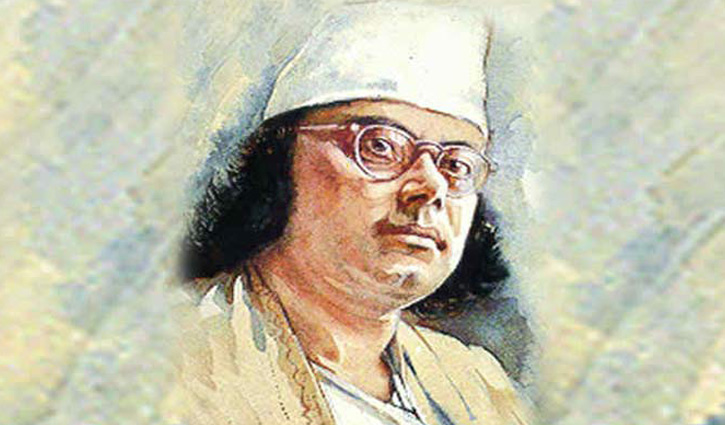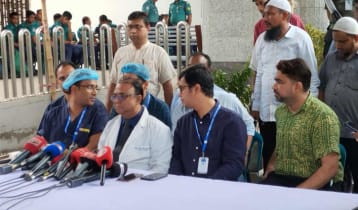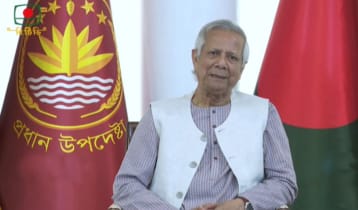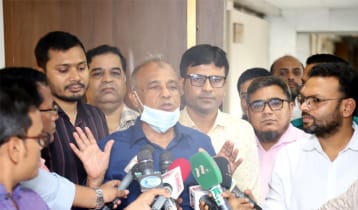Kazi Nazrul Islam’s 120th birth anniversary today
4 || risingbd.com

Desk Report: The 120th birth anniversary of National Poet Kazi Nazrul Islam is being celebrated today (Saturday) across the country in a befitting manner.
An elaborate programme has been taken at the national level to mark the day. Different organizations and cultural bodies in the capital and in districts are also celebrating the day amid various functions.
Main programme will be arranged at Trishal in Mymensingh, where the poet had a lot of memoires.
Education Minister Dr Dipu Moni will attend the function as the chief guest at 3pm with State Minister for Cultural Affairs KM Khalid in the chair.
Visva-Bharati University Vice-Chancellor Professor Bidyut Chakrabarty will attend the function as the special guest.
This year’s theme of the anniversary has been set as “Bangabandhu’s Bangladesh in Nazrul’s Conscience”.
Besides, the birth anniversary of the national poet will be celebrated in the poet’s memorable place in Doulatpur in Cumilla, Tewta in Manikganj and Karpasdanga in Chuadanga and Chattogram.
In capital Dhaka, the celebration began with placing of wreaths by the people of all strata at the poet’s grave beside the Dhaka University central mosque in the morning.
The Nazrul Institute and the Shilpakala Academy have also organized programmes marking the day.
The birth anniversary of the national poet will also be celebrated at educational institutions and district headquarters across the country.
Bangladesh Television, Bangladesh Betar and private television channels are airing special programmes and print media have brought out special supplements highlighting the birth anniversary of the national poet.
Kazi Nazrul was born on the 11th Joishtha in Bengali calendar year 1306 in Churulia, near Asansol in the Burdwan district of West Bengal.
He was famous for his fiery poem Bidrohi (The Rebel) and his many melodious songs. He was a poet, lyricist, musician, revolutionary and philosopher.
The nation got inspirations from Nazrul’s poems and songs during the great Liberation War and all democratic movements and struggles.
There are 2,400 of his songs, and together, they are known as Nazrul-Geeti or Nazrul Sangeet. He composed the songs, which he liked to tune himself.
Considering his impressive talent, Rabindranath Tagore dubbed him as Saraswati’s bor-putra (the gifted son of the Goddess of learning).
Nazrul was the poet of rebellion against injustice and taboos. His nickname was Dhukhu Miah (Mr. Sorrow). True to his name, Nazrul suffered a lot in his life.
His father died in 1910 while he was still at school and he became the breadwinner of the family working for a bakery company.
Later, he resumed studies at Darirampur, Trishal, Mymensingh. But he left his studies to join the British Indian Army as a non-commissioned officer and was posted to Karachi. He left the army and settled in Kolkata, where he started publishing a fortnightly, Dhumketu (The Comet).
The magazine had a fiery tone and was critical of the British rule in India. He soon found himself in prison for publishing a poem written by him, “Anandomoir Agomone” (Advent of Goddess Durga-the Goddess of destruction of all evil).
In prison, he did not stop writing. He wrote, “Rajbandir Jabanbandi” (Deposition of a political prisoner).
After a prolonged hunger strike, Nazrul was released from the prison. But throughout the 1920s, he found most of his work banned. After the death of his second son, Kazi Bulbul, the poet was sad. He wrote, “My nightingale sleeps forever.”
Although known for his rabid criticism of imperialism, social and religious taboos, Nazrul also explored the themes of love, romance and devotion.
He also introduced a robust style that was very bold and innovative. His use of Persian and Arabic words in Bengali poetry also opened up new literary horizons. In the 1930s, the leading gramophone company of India, HMV, as a lyricist, employed him full-time.
Later All-India Broadcasting Authority employed him. But his luck once again ran out and in 1942, he developed a rare neurological disorder that led to the loss of his voice and memory. Doctors in Vienna diagnosed it as Pick’s disease.
After independence, Nazrul was declared the national poet and he was brought to Dhaka from Kolkata. He died here in 1976 and was buried beside the central mosque at Dhaka University.
In his short articulate years, he also wrote and directed a play, Byathar Dan (The gift of pain).
Source: BSS
risingbd/May 25, 2019/Mukul
risingbd.com


















